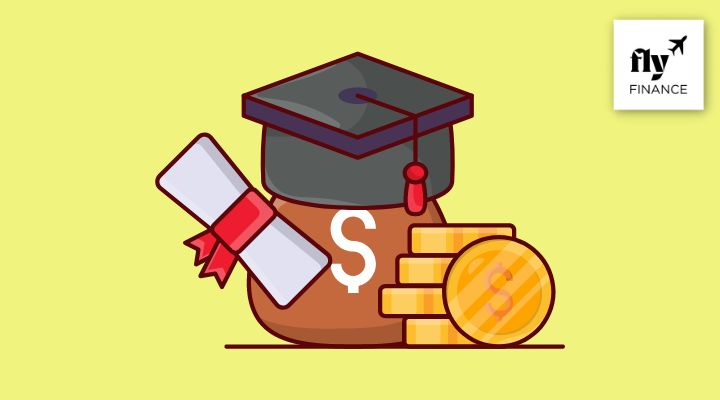Difference between Student Loan and Financial Aid: Every year, hundreds of Indian students consider studying overseas but are deterred because of the cost. The good news is that this concern can be easily resolved. Some of the simplest ways to pay for your higher education abroad are through student loans or financial aid. A student today has a wide range of loan and financial aid options to consider. Students can choose from these options based on their needs, preferences, and advantages of both methods. Continue reading the blog post on student loans vs financial aid to learn more about them.
Table of contents
Difference between Student Loan and Financial Aid
Given below are some of the similarities and differences between student loans and financial aid:
| Similarities | Differences |
| Both sources are used to help students to fund their education-related expenses. | One of the major differences between the two is that the loans are required to be repaid along with interest and on set terms and conditions. However, financial aid does not necessarily be repaid. |
| Students are required to fill out the FAFSA in order to avail of student loans and financial aid | Both sources may be paid out differently |
| In order to avail of either a student loan or financial aid, a student is required to meet certain eligibility criteria | Financial aid like grants and scholarships are offered based on academic excellence while student loans may or may not be need-based. Private lenders set criteria for lending the loan |
Definition of Student Loan and Financial Aid
The following are the definitions of student loans and financial aid:
Student Loan
A student loan is a money a student borrows from the government or a private money lender to pay for the financial expense of their higher education including tuition, accommodation and more. A borrower would be required to repay the loan along with the interest rate applied on the loan based on the set terms and conditions. There are two types of student loans namely federal student loans and private student loans.
Financial Aid
Basically, financial aid is the funding available for students to cover the financial expenses of their higher education including, tuition fees, accommodation and school supplies. They are often offered to encourage students to pursue their education from abroad as well. Federal organizations, states, schools, universities and private sources offer financial aid.
Also Read: Types of Education Loan for Indian Students
Types of Student Loan and Financial Aid
The following are the types of student loans and financial aid:
Student Loan
- The federal government made and directly funds federal student loans. Students who wish to apply for these loans are required to complete the Free Application for Federal Student Aid (FAFSA)
- On the other hand, private lenders such as online lender and banks made and funds private student loans. These loans are also referred to as alternative or non-federal loans.
Financial Aid
The following are the various types of financial aid available for students:
- Scholarships: Many organizations be it government or educational institutions offer scholarships to students to help them pay the expenses of their higher education. There are certain set criteria for these scholarships, students must meet the specified criteria to avail of the scholarship. The requirements are generally, academic achievements, athletic achievements, work experience, community involvement and more.
- Grants: A grant is a type of financial aid that does not need to be repaid and is typically based on the financial need of the applicant
- Federal Work-Study Programs: Many federal organizations offer funds to encourage students to pursue their higher education and also help eligible students to get part-time employment
Also Read: Loans to Study Abroad
Pros and Cons of Student Loans
Let’s look at the pros and cons list to understand student loans better:
Pros
- Loans offer great support to students who are otherwise unable to attend colleges
- For federal student loans, you are not required to demonstrate any credit history and for private loans you can have the support of a creditworthy co-applicant for future repayment of the loan
- Student loans can be used for various purposes including tuition fees, accommodation and more
- Federal loans offer various repayment assistance options
Cons
- You will have a debt to pay off after graduating from your college
- Student loans can be expensive
- Defaulting on our student loan can create a negative impact on your credit history
- Private student loans have generally varying and higher interest rates
Also Read: Education Loan Insurance
Pros and Cons of Financial Aid
Let’s look at the pros and cons list to understand financial aid better:
Pros
- Typically, students are not required to repay the amount of financial aid
- Students can potentially decrease the pressure of debt by minimizing the amount they have to borrow
- Applying for financial aid opens up new opportunities for students to pursue their education in better institutions than they could with the financial assistance
- Financial aid enables students to focus more on their education without worrying about the repayment of the amount
Cons
- Unfortunately, financial aid does not cover the cost of all school-related expenses
- The competition for financial aid such as scholarships, grants and work-study program is generally quite extreme
- Students might be required to maintain certain standards of academics, athletics etc each semester as part of the eligibility requirements
- Financial aid does not offer much flexibility over the spending of funds
FAQs
Private lenders such as online lenders and banks made and fund private student loans. These loans are also referred to as alternative or non-federal loans.
The following are the various types of financial aid available for students:
Scholarships
Grants
Federal Work-Study Programs
The following are the benefits of availing of student loans:
Loans offer great support to students who are otherwise unable to attend colleges
For federal student loans, you are not required to demonstrate any credit history and for private loans you can have the support of a creditworthy co-applicant for future repayment of the loan
Student loans can be used for various purposes including tuition fees, accommodation and more





























